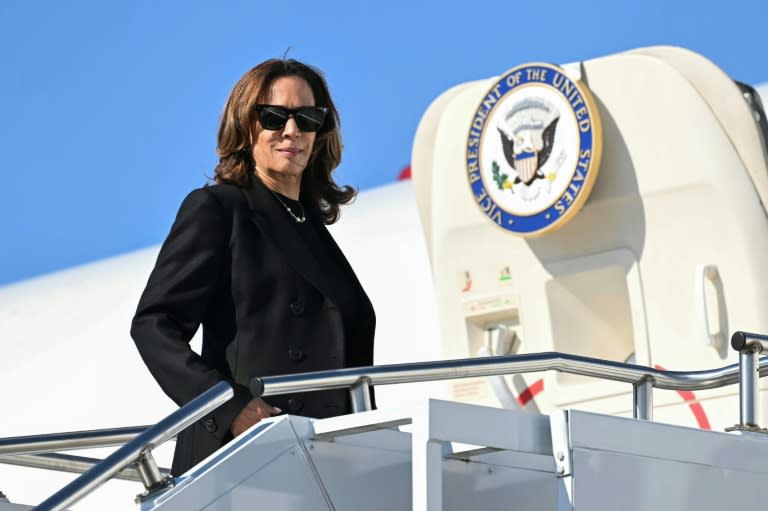Harris's policies to face debate spotlight

Kamala Harris has unveiled a few centrist-leaning policies, abandoned some past positions and left much else vague as she gears up for a critical US presidential debate with Donald Trump.
The Democratic vice president unveiled a list of policies on her website on the eve of the clash, with Republicans accusing her of "flip-flopping" on key issues.
Here is where the White House hopeful stands in five key areas:
- 'Opportunity economy' -
Harris has stressed her commitment to the United States' middle class, citing her own background of being raised by a single mother in California, and said she wants to create an "opportunity economy."
One of her most concrete policies so far is a child tax credit of $6,000 for families of newborn children. She has also promised tax cuts for 100 million Americans while raising taxes on the richest, and to bring down housing prices.
Tax is one of the few policy areas where she has broken with President Joe Biden. In a nod to moderate voters, she wants a 28 percent tax on capital gains, less than the 39.6 percent proposed by Biden.
Harris has also promised to end taxes on tips paid to service industry workers -- weeks after Trump announced a similar policy.
She has said she will take on "price gouging" by corporations to tackle high prices -- one of her main weak spots against Republican Trump -- but her plans on that front remain vague.
- Environmental flip-flops -
Harris has not set out a detailed environmental policy except on one key area: fracking.
She has vowed not to ban the practice, which uses high-pressure water to extract oil and gas -- despite previously saying that she was opposed to it.
In her first and only on-screen interview since becoming the Democratic candidate, she told CNN that her "values have not changed" even if her position had.
Harris has, according to the Axios news site, also backtracked on her opposition to plastic straws.
As vice president, she has strongly backed Biden's green energy transition under the so-called "Inflation Reduction Act."
- Border 'consequences' -
Illegal migration over the US-Mexican border is one of the most sensitive issues in the campaign.
Harris said in her CNN interview there would be "consequences" for people crossing illegally.
She supported Biden's bid to toughen migration policy and has backed investing in the border "wall" that Trump called for -- despite her criticizing it in the past.
Biden's proposals, however, have never made it through a divided Congress, with Republicans blocking them to cause Democrats political damage.
- Firm on abortion -
Harris's position on abortion, another key election issue, is not in doubt.
She has repeatedly criticized Trump for bragging that he enabled the US Supreme Court to overturn the federal right to terminate pregnancies.
Harris has said that if elected she would push to enshrine protections for abortion in US law.
- Gaza quagmire -
Harris has been more vocal than Biden on the issue of civilians killed by Israel in the war in Gaza, leading to speculation that she might take a tougher line with the US ally.
But during her CNN interview she said she would not halt arms deliveries to Israel, despite calls among Democrats and Arab American voters to do so, and pledged to help Israel defend itself.
dk-aue/aha
